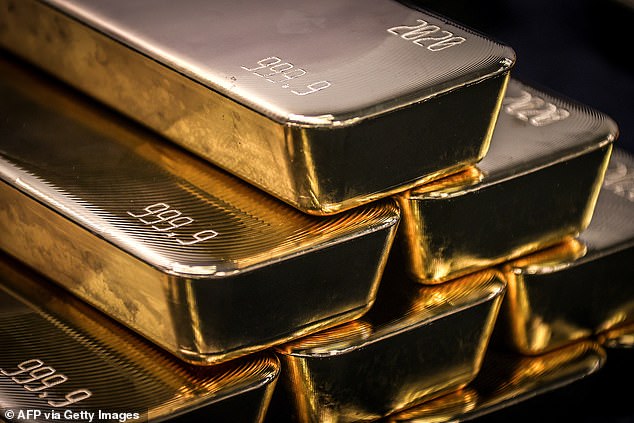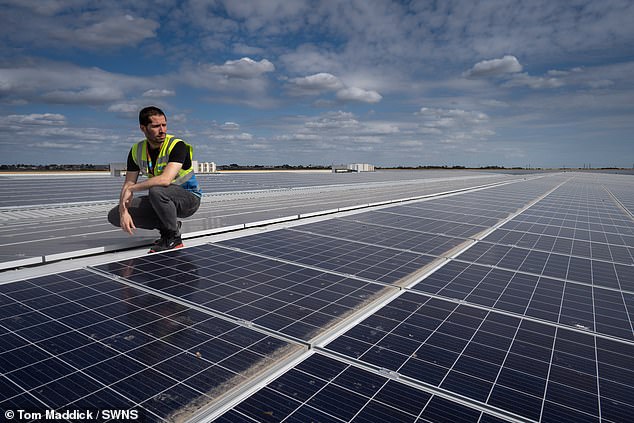Metals miner Fresnillo cuts gold production forecasts after its Mexican mines are hit by Covid
- Gold and silver are seen as safe investments in economically uncertain times
- The firm blamed a drop in workers at its Herradura mine for its lower forecasts
- Fresnillo’s silver production guidance remains unchanged at 51-56m ounces
Anglo-Mexican mining firm Fresnillo has said the impact of the coronavirus pandemic on its mines in Mexico has forced it to cut gold production guidance again this year.
The FTSE 100 group expects to extract between 745,000 and 775,00 ounces of gold, about 40,000 down from its late July forecast, and below its 815,000 to 900,000 ounces estimate given in its first-quarter results in April.
It blamed the reduction in workers at its Herradura mine as well as ‘lower than expected’ ore grades for its curtailed projections. Shares fell 5.3 per cent during the day to £12.75.

The FTSE 100 firm expects to extract between 745,000 and 775,00 ounces of gold this year
Gold extraction declined by 6.3 per cent to 172,700 ounces in the three months to the end of September compared to the previous quarter.
Chief executive Octavio Alvídrez said the firm had experienced ‘some impact as a result of the additional working restrictions in place at the open-pit mines and this has affected our gold production.’
Lead production slid by a slightly greater percentage to 15,100 tonnes; however, total lead output in the first nine months of the year remains 11.1 per cent larger, which Fresnillo attributes to a higher ore grade at its Saucito location.
The group’s full-year silver production guidance also remains unchanged at 51 million to 56 million ounces ‘despite the disruption of this pandemic,’ remarked Alvidrez, which has led to massive cuts in output at its Fresnillo plant.
‘As we set out at our half-year results, we have seen some impact as a result of the additional working restrictions in place at the open-pit mines, and this has affected our gold production, so we have marginally reduced our full-year guidance for gold.’
Gold and silver prices have soared this year as investors seek to put their money in traditionally safe havens during a time of tremendous economic uncertainty.


Silver demand has grown as renewable energy technologies like solar panels has taken off
Ultra-low interest rates have also lessened returns on government bonds, thereby making these chemical elements more attractive. Silver has received an extra boost from the growing demand for renewable energy technologies like solar panels.
An ounce of gold is worth over a third higher this year at £1,470.35, while silver’s value has increased by around 40 per cent. Consequently, Fresnillo has seen its share price almost double this year.
In the last six months, only B&Q owner Kingfisher’ share price has outperformed it among FTSE 100 companies. Among the FTSE 350 meanwhile, it is in the top 20, just ahead of Baillie Gifford US Trust and industrial equipment giant Ashtead Group.


Among FTSE 100 firms, only B&Q owner Kingfisher has seen its share price outperform Fresnillo in the last six months, with over 133 per cent growth against the miner’s 76.4 per cent
At ninth place is Hochschild Mining, another business with a strong presence in the Americas. Its shares have risen 104.8 per cent in 2020. Other metals producers such as Evraz and Kaz Minerals have grown 58.5 and 51 per cent, respectively.
Egyptian gold miner Centamin has been an exception to this growth, however.
Its shares plummeted by a fifth this morning after it revealed that it had slashed its gold production guidance both for this year and next.
Stocks fell in spite of third-quarter results showing revenues shot up 43 per cent in the last quarter against the same period in 2019 and gold production soaring 30 per cent to 128,240 ounces.
